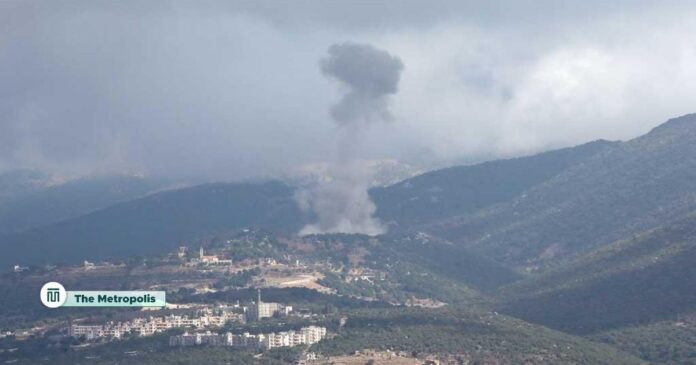Hezbollah and Israel engaged in intense clashes on Sunday, with the Lebanese militant group launching rockets deep into northern Israel following one of the heaviest bombardments in nearly a year of conflict.
During the funeral of a Hezbollah commander killed last week in Beirut, the group’s deputy chief, Naim Qassem, addressed mourners, stating, “We have entered a new phase, marked by an open-ended battle of reckoning.”
Israeli Defense Minister Yoav Gallant stated that military operations would continue until it is safe for evacuated individuals on Israel’s side of the border to return, indicating a potential for prolonged conflict as Iran-backed Hezbollah has pledged to keep fighting until a ceasefire is reached in the ongoing Gaza war.
Israel’s Chief of General Staff, Herzi Halevi, said in a televised address that the military is well-prepared for the next phases of combat expected in the coming days, although he did not specify what actions would be taken. “We will do whatever it takes to eliminate threats against Israel,” Halevi emphasized.
The conflict, which has sharply intensified over the past week, began when Hezbollah opened a second front against Israel, claiming it was supporting Palestinians facing an Israeli offensive further south in Gaza.
On Tuesday and Wednesday, numerous pagers and walkie-talkies used by Hezbollah members malfunctioned, an incident widely attributed to Israeli actions, though Israel has not confirmed or denied involvement. The day after, Israel conducted its most extensive bombardment of Lebanon to date.
On Friday, an Israeli airstrike in Beirut’s southern suburb targeted senior Hezbollah commanders, resulting in 45 fatalities, according to the Lebanese health ministry. Hezbollah reported that 16 of its members were among the deceased, including high-ranking leaders Ibrahim Aqil and Ahmed Wahbi.
In a subsequent wave of intense bombardment on Saturday, the Israeli military claimed to have struck approximately 290 targets, including thousands of Hezbollah rocket launchers. “In recent days, we have delivered blows to Hezbollah that it never anticipated,” Israeli Prime Minister Benjamin Netanyahu stated in a video message. “If Hezbollah hasn’t grasped the message yet, I assure you, it will.”
SIRENS SOUND, SCHOOLS CLOSED
At the funeral of Hezbollah commander Aqil on Sunday, Naim Qassem stated that Israel aims to incapacitate the group but will not succeed. He warned that Israel’s escalation in the conflict would only result in further displacement of its own citizens.
In response to the situation, Israel has closed schools, limited gatherings in northern areas, and instructed hospitals to relocate patients and staff to secure zones—many of which are fortified or underground to withstand rocket attacks.
Air raid sirens were activated continuously throughout Israel on Sunday, as approximately 150 rockets, cruise missiles, and drones were launched at the country overnight and into the day, most of which were intercepted by air defense systems. Some buildings, including a house near Haifa, sustained significant damage. While rescue teams treated the wounded, there were no reports of fatalities. Residents were advised to remain close to bomb shelters and safe rooms.
Hezbollah claimed to have targeted an Israeli barracks and other positions using swarms of attack drones and also launched rockets at military-industrial sites in what they described as an “initial response” to recent attacks.
An official from the Islamic Resistance in Iraq, an alliance of Iran-backed armed factions, stated that they executed cruise missile and explosive drone strikes on Israel early Sunday as part of “a new phase in our support front” with Lebanon, adding that “escalation in Lebanon means escalation from Iraq.”
‘IMMINENT CATASTROPHE’
UN special coordinator in Lebanon, Jeanine Hennis-Plasscharet, expressed on social media that “with the region on the brink of an imminent catastrophe, it cannot be overstated: there is NO military solution that will ensure safety for either side.”
Lebanon’s top Christian cleric, Bechara Boutros al-Rai, expressed sorrow during his Sunday sermon for the casualties among civilians and Hezbollah members from the past week’s attacks—a rare acknowledgment of condolence from a Christian leader toward the group. He called on the UN Security Council to take action to end the war by any available means.
Since Hezbollah began launching rockets at Israel in October, tens of thousands of people have evacuated their homes on both sides of the Israel-Lebanon border. The current conflict in Gaza began on October 7 when Hamas attacked Israel, resulting in the deaths of around 1,200 people and approximately 250 hostages, according to Israeli sources. Israel’s subsequent military campaign in Gaza has resulted in over 41,300 Palestinian deaths, as reported by the local health ministry, and has devastated the region.



